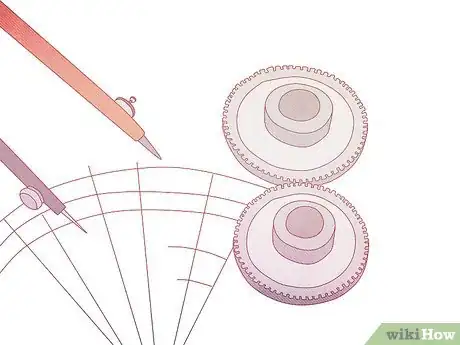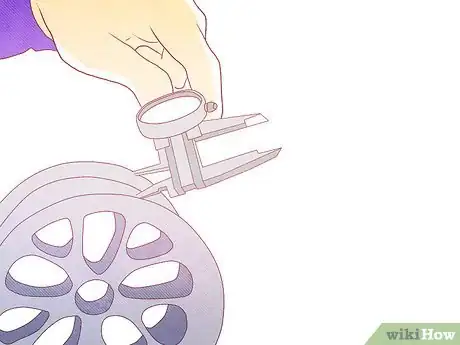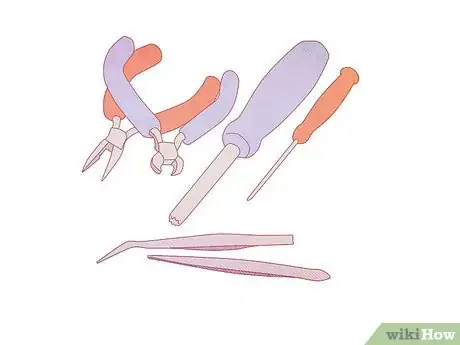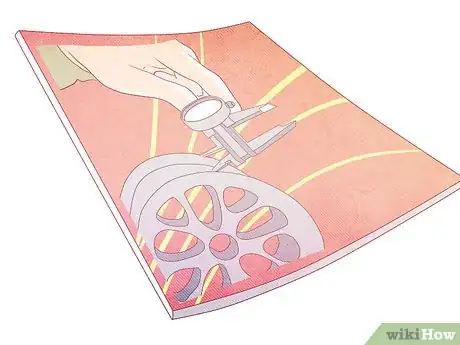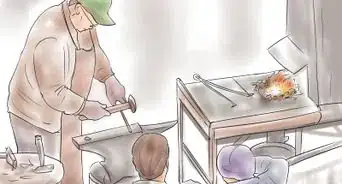X
wikiHow is a “wiki,” similar to Wikipedia, which means that many of our articles are co-written by multiple authors. To create this article, 17 people, some anonymous, worked to edit and improve it over time.
This article has been viewed 143,993 times.
Learn more...
Tool and die makers are at the top of the ladder in the metalworking trades. They are very versatile in using their hands for creating parts as well as machines to produce high precision parts. Their abilities go beyond that of the typical machinist. They are capable of designing and fabricating tools with no supervision. With these skills, tool and die makers are a tremendous asset in any manufacturing facility.
Steps
-
1Master basic math. Understand addition, subtraction, and division. A little shop trigonometry is good for calculating bolt circles and finding the length of triangles. Some basic algebra can also be handy for applying handbook formulas.[1]
-
2Learn computer drafting. Suitable skills are included in vocational and technical schools' machining programs. Learn to create and interpret mechanical drawings.[2]Advertisement
-
3Enter an apprenticeship program at a tool and die shop while in high school if possible. As an apprentice, you will do simple tasks like drilling, deburring, and sweeping in the beginning. The tasks will become more challenging as time goes on. You will learn the lathe, mill and surface grinder. Apprenticeships typically last 2 to 4 years.[3]
-
4Study machine tool technology at a good vocational trade school. Programs vary from school to school. Make sure you are studying at one that has various machines to learn from. A wire EDM (electrostatic discharge machining) tool would be nice. Also, make sure they have good CNC (computer numerically controlled) programming courses. Try to get hands-on experience in a shop rather than studying only in a classroom. The heart of your education will be in the types of projects you will be making in the course. A typical machine tool technology program will last two years.[4]
-
5Get a copy of the Machinery Handbook and refer to it often. This is an excellent reference for answering any machining problem.[5]
-
6Buy a set of good high quality precision tools like 1-−2–3 inch (−5.1–7.6 cm) micrometers, and a square set, along with a 7- or 11-drawer machinists toolbox. An electronic caliper is a plus also.
- Try to stay away from generic tools because these seem to be less durable. Instead, invest in high quality tools like Starrett and Mitutoyo, top names in the trade.
- If money is tight, obtain tools gradually, as you need them, over time, until you have your own set. Get the ones you need most first.
-
7Once you land a job, focus on gaining experience. Learn from veteran tool and die makers. They can and often do share many tips they have learned over the years.
-
8Talk with other tool and die makers on the internet in various discussion forums especially concerning CNC programming.
-
9Read metalworking trade publications in your spare time.
-
10If you want to further your career in the tool and die trade, you may want to move into supervision or teaching. A Bachelor's degree in almost any field along with tool and die experience would be very beneficial in obtaining a supervisor's job in manufacturing and/or teaching.
Advertisement
Community Q&A
-
QuestionIs it possible to work abroad with this trade?
 Community AnswerYes, it is possible to work abroad as a tool and die maker.
Community AnswerYes, it is possible to work abroad as a tool and die maker. -
Questionis there degree program available in tool and die?
 Community AnswerThere can be several routes to becoming a toolmaker. Most states schools and junior college's have several different degrees available that can include Math courses, CAD/CAM, basic machine shop and precision machine shop. The US government typically offsets some of the costs for this degree if you will apply. Apprenticeships are available in states and sometimes on a shop by shop basis. This is how most older toolmakers began their career. You will gain most of your basic skills this way but depending on the shops training program you might need to go to school for 4 and 5 axis programming. Training courses are available from private companies at their own shop or online.
Community AnswerThere can be several routes to becoming a toolmaker. Most states schools and junior college's have several different degrees available that can include Math courses, CAD/CAM, basic machine shop and precision machine shop. The US government typically offsets some of the costs for this degree if you will apply. Apprenticeships are available in states and sometimes on a shop by shop basis. This is how most older toolmakers began their career. You will gain most of your basic skills this way but depending on the shops training program you might need to go to school for 4 and 5 axis programming. Training courses are available from private companies at their own shop or online. -
QuestionHow much does a tool and die maker company earn per year?
 Community AnswerUp to $100,000 working for Fortune 500 company (having been there many years).
Community AnswerUp to $100,000 working for Fortune 500 company (having been there many years).
Advertisement
Warnings
- Always think of safety first in a machine shop.⧼thumbs_response⧽
- Know proper safety precautions and use good common sense when using a machine. It can maim if used carelessly.⧼thumbs_response⧽
- Be extremely careful in this trade. Proper safety glasses are a must to prevent eye injury. Always wear safety glasses when entering a Tool and Die Shop.⧼thumbs_response⧽
Advertisement
References
- ↑ https://bigfuture.collegeboard.org/careers/production-tool-die-makers
- ↑ https://www.careerexplorer.com/careers/tool-and-die-maker/
- ↑ https://job-outlook.careerplanner.com/Machinists-and-Tool-and-Die-Makers.cfm
- ↑ https://job-outlook.careerplanner.com/Machinists-and-Tool-and-Die-Makers.cfm
- ↑ http://library.uc.edu.kh/userfiles/pdf/19.Machinery's%20handbook.pdf
About This Article
Advertisement

